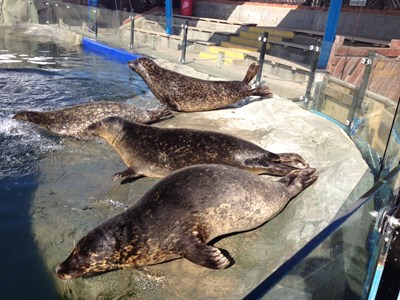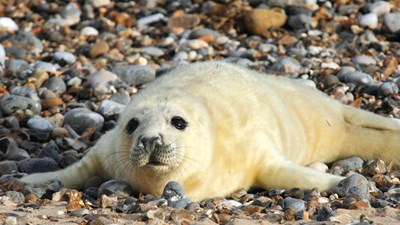- SEA LIFE, Seal Pool
Common Seals
Also known as harbour seals, common seals are characteristic of sandflats and estuaries. The Wash of East Anglia is home to the UK’s largest colony, although they are also found on rocky shores in Scotland.
Meet our resident seals
SEA LIFE Scarborough is home to four resident common Seals - Pendle, Ed, Boo and Mando. They are very inquisitive and love to follow our guests around whilst splashing and showing off!
Dive in and learn all about our resident seals with a VIP experience.


Did you know?
- There are 35 different Seal species worldwide, the rarest is the Mediterranean Monk Seal with fewer than 500 left in the world
- Seals can hold their breath underwater for up to 30 minutes!
- Oil from Seal blubber was once used for making soap and paints! Thankfully, legislation came in to make seal hunting illegal in the UK

Rescued Seals
Unfortunately, our Seals live at the centre due to various different health reasons, and would not be able to survive if released back into the wild.
As well as housing these resident Seals, SEA LIFE Scarborough is home to the only Seal Hospital in Yorkshire.
Seal Rescue, Rehabilitation and Release
We rescue over 30 injured seal pups from local coastal waters each year and bring them to our Seal Hospital to undergo a rehabilitation programme. It costs £2,000 to look after just one seal pup for six weeks and get them fit for their release back into the wild, so we are extremely grateful our guests continue to support the work we do.


During the rehabilitation process
Injured seals are placed in the Seal Hospital pens and treated with antibiotics and medication. Our guests are able to visit the hospital to see how our patients are doing - please be aware that this is an operating animal hospital and some people may find it upsetting.
Once a seal is free from infection and a healthy weight, we then introduce them to a rehabilitation pool where they can get used to being back in the water. After this, they are introduced into our main pool to learn how to fight for fish again against our resident seals.
Once the animal care team are satisfied a seal is able to survive again in the wild, they are released back into a seal colony.